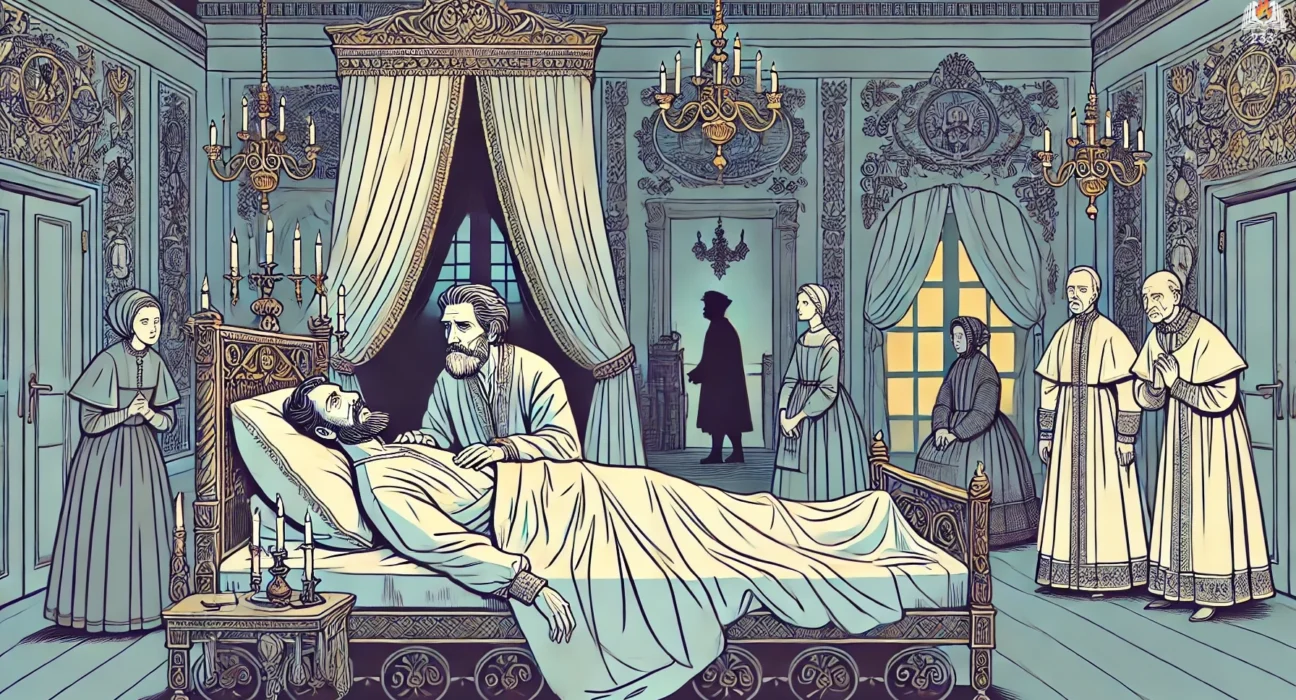The Death of Ivan Ilych by Leo Tolstoy, first published in 1886, is a profound exploration of life, death, and existential reflection. The novella centers on the gradual deterioration and eventual death of Ivan Ilych, a high-ranking judge in 19th-century Russia. It portrays the seemingly ordinary life of Ivan, which is disrupted by a terminal illness that forces him to confront the superficiality of his existence and grapple with the deeper meaning of life and mortality.
Plot Summary
Ivan Ilych Golovin lived a life that many would call ordinary, but in its ordinariness lay an unseen tragedy. A respected judge and a man who took pride in living by the expectations of his social class, Ivan’s life was defined by duty, decorum, and ambition. He was a man who did everything right according to society’s standards, rising steadily through the ranks of the judicial system, marrying a woman from a good family, and ensuring his home and life were perfectly aligned with the values he upheld.
But Ivan’s life, outwardly perfect, was inwardly hollow. His marriage to Praskovya Fedorovna, once full of polite affection, became a source of bitterness. The early charm between them eroded as the demands of family life grew, particularly with the arrival of their children. Ivan retreated into his work, finding solace in the structured and impersonal world of the law courts, where he could exercise his power and authority without emotional entanglement.
Life proceeded in this unremarkable, mechanical way until, one day, something happened that shattered the routine of Ivan Ilych’s existence. While arranging the curtains in his new home—a home he had painstakingly designed to reflect his success and taste—Ivan slipped and injured his side. At first, it seemed trivial, just a bump that left a bruise. But the pain lingered, a dull, persistent ache that grew with time.
Ivan visited doctors, men of his class who spoke with the same detached professionalism that he himself wielded in court. They discussed symptoms, offered diagnoses that varied, and prescribed treatments with an air of confidence that did little to soothe his growing anxiety. Beneath their clinical assurances, Ivan felt a chilling realization: something was terribly, irreversibly wrong.
As the pain worsened, creeping from his side to fill his entire existence, Ivan began to grapple with a reality he had never confronted—the inevitability of death. He could no longer escape into work or social niceties. His colleagues, like Peter Ivanovich, spoke of him in the past tense before he was even gone, more concerned with the practicalities of his death than its tragedy. Even his wife, Praskovya, seemed distant, fixated on securing her financial future rather than offering him comfort. Their marriage had long been loveless, and now, in his greatest moment of need, it became painfully clear that he was utterly alone.
The only person who treated Ivan with genuine care was Gerasim, the young peasant who attended to him during his illness. Gerasim’s simple acceptance of death, his willingness to sit by Ivan’s bedside and ease his suffering without fear or disgust, stood in stark contrast to the indifference of the people in Ivan’s social circle. Gerasim would lift Ivan’s legs, alleviating the unbearable pain, and in those moments, Ivan found a strange solace. The young man’s uncomplaining presence hinted at a truth Ivan had never understood—life’s meaning was not found in power, status, or conformity but in human connection and compassion.
As Ivan’s physical condition deteriorated, so did his mental state. His thoughts turned inward, swirling in a vortex of fear and confusion. Why was this happening to him? He had lived his life as he was supposed to. He had been dutiful, respectable, and successful. But as death loomed closer, Ivan realized that his life had been a lie, a series of empty gestures designed to meet societal expectations rather than personal fulfillment.
This agonizing self-awareness came to Ivan during sleepless nights filled with the gnawing pain that no medicine could dull. He began to scream in torment, not just from the physical agony but from the existential terror of realizing that he had lived wrongly. His family, uncomfortable and helpless in the face of his suffering, avoided him as much as possible, leaving Ivan to face the approach of death alone.
In his final days, Ivan experienced a profound transformation. As death became an undeniable reality, he stopped resisting it. His mental anguish, which had consumed him, gave way to a strange clarity. He began to see his life for what it had been—a superficial pursuit of status, devoid of love or real purpose. The fear that had gripped him began to dissolve, replaced by a quiet acceptance.
In his last moments, as his wife and children stood around his bed, Ivan’s thoughts shifted from his own suffering to theirs. He saw the fear in their eyes, the discomfort they felt at the sight of his death, and suddenly, he felt pity for them. They, too, were living the same false life he had led, unaware of the truths he had discovered too late. In a moment of final revelation, Ivan understood that the key to life was not to resist death but to embrace it with love and compassion.
With this realization, the physical pain that had tormented him for months began to fade. He looked around at his family, forgave them silently, and felt, for the first time, a sense of peace. “Death is finished,” he thought. “It is no more.”
In the stillness that followed, Ivan Ilych slipped away, his face serene, as if in his dying moments, he had discovered the secret that had eluded him throughout his life. He had feared death, but in the end, he saw it not as an enemy, but as a release from the falsehoods that had bound him. And with that understanding came the peace he had sought all along.
Main Characters
Ivan Ilych Golovin: The protagonist, a member of the Court of Justice. Ivan is an ambitious and self-satisfied man who has always prioritized his career and societal status. His terminal illness forces him to re-evaluate his life choices, leading to a painful realization of his isolation and the superficiality of his relationships.
Praskovya Fedorovna: Ivan Ilych’s wife, portrayed as self-centered and indifferent to Ivan’s suffering. Their marriage, once a source of convenience and social decorum, becomes strained as Ivan’s health declines, reflecting the emptiness of their relationship.
Gerasim: Ivan’s peasant servant, who stands out for his compassion and simple wisdom. He is the only character who offers Ivan genuine comfort during his illness, symbolizing the contrast between the artificial lives of the upper class and the authentic simplicity of the lower class.
Peter Ivanovich: Ivan’s colleague and friend, who represents the detached and pragmatic mindset of Ivan’s social circle. His concern for social propriety rather than true empathy mirrors the shallow nature of Ivan’s own life before his illness.
Theme
The Fear of Death: The central theme of the novella is Ivan’s confrontation with death, which initially fills him with fear and denial. Through his illness, he is forced to acknowledge the inevitability of death and the futility of escaping it.
Alienation and Isolation: Ivan’s life, dominated by his career and social ambitions, isolates him emotionally from his family and friends. His illness further intensifies this isolation, as those around him are unable or unwilling to understand his suffering.
The Search for Meaning: As Ivan nears death, he reflects on the meaning of his life. His existential crisis leads him to realize that he has lived a shallow, self-serving life, which contrasts with the simplicity and authenticity of characters like Gerasim.
Social Hypocrisy: Tolstoy critiques the upper-class preoccupation with appearances and societal status. Ivan’s colleagues and even his family are more concerned with decorum than with his suffering, revealing the moral emptiness of their lives.
Writing Style and Tone
Tolstoy’s writing in The Death of Ivan Ilych is characterized by its simplicity and directness, which effectively mirrors the story’s themes of existential clarity. The prose is straightforward, yet it carries a profound philosophical depth, allowing readers to deeply connect with Ivan’s internal struggles. Tolstoy avoids grandiloquent language and focuses instead on the raw emotional and psychological experiences of his protagonist. The narrative is structured in such a way that it gradually pulls the reader into Ivan’s consciousness, creating a sense of intimacy with his thoughts and fears.
The tone shifts throughout the novella, starting with a sense of detachment and almost clinical observation of Ivan’s life. As the story progresses and Ivan’s illness worsens, the tone becomes increasingly introspective, melancholic, and anxious. By the end, Tolstoy’s tone carries a quiet intensity, as Ivan’s internal torment gives way to a transcendent sense of peace. This tonal progression mirrors Ivan’s own journey from denial and despair to acceptance and, ultimately, spiritual awakening.
We hope this summary has sparked your interest and would appreciate you following Celsius 233 on social media:
There’s a treasure trove of other fascinating book summaries waiting for you. Check out our collection of stories that inspire, thrill, and provoke thought, just like this one by checking out the Book Shelf or the Library
Remember, while our summaries capture the essence, they can never replace the full experience of reading the book. If this summary intrigued you, consider diving into the complete story – buy the book and immerse yourself in the author’s original work.
If you want to request a book summary, click here.
When Saurabh is not working/watching football/reading books/traveling, you can reach him via Twitter/X, LinkedIn, or Threads
Restart reading!








